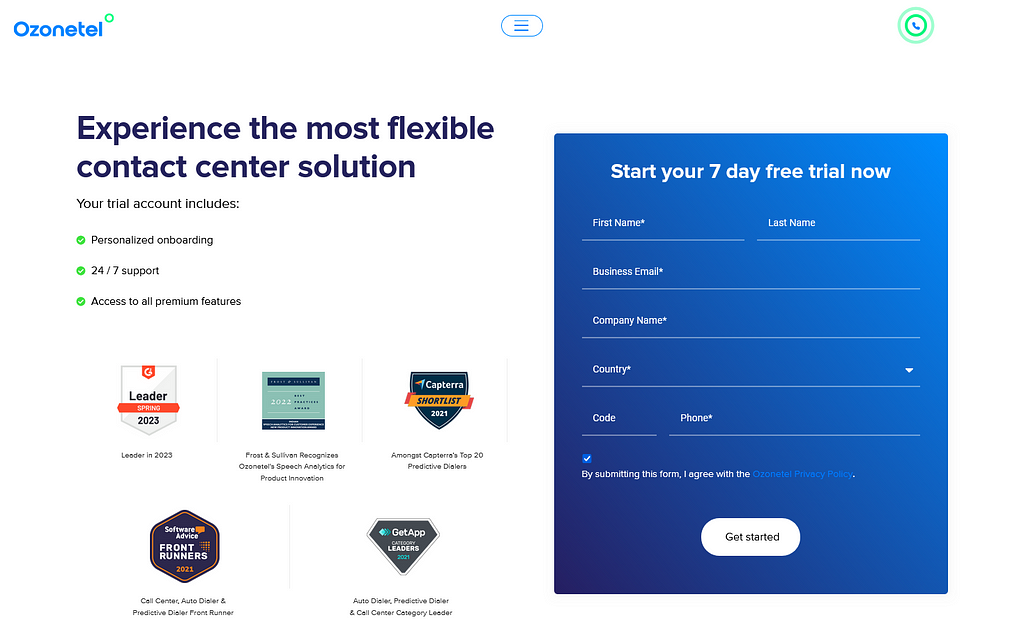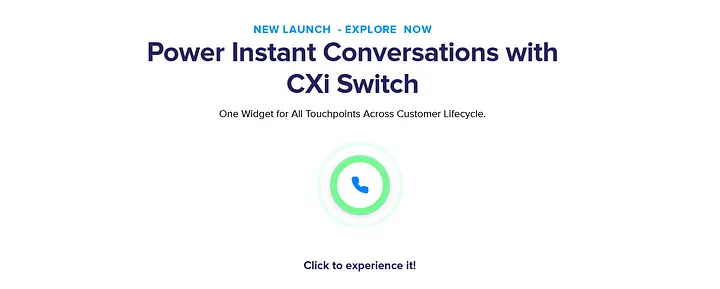- Resources
- What Is Predictive Dialer? A Comprehensive Overview
What Is Predictive Dialer? A Comprehensive Overview

Are you tired of your sales team spending more time navigating answering machines and busy signals than engaging with potential clients? Did you know that 75% of executives are open to appointments via cold calls? Optimizing your agents’ talk time is crucial for your outbound sales strategy.
Imagine a tool that not only minimizes dialing hassles but also maximizes your team’s productivity. That’s where predictive dialer software comes in. In this blog, we’ll explore how predictive dialer software revolutionizes your approach, ensuring your agents connect with decision-makers swiftly. Predictive dialers enhance your connection with potential customers and optimize your customer outreach.
In this article, we will explore:
- 1. What Is a Predictive Dialer?
- 2. How Do Predictive Dialers Work?
- 3. How Many Calls Can a Predictive Dialer Make Per Hour?
- 4. The Challenges of Outbound Calling That Predictive Dialers Can Solve
- 5. Predictive Dialers vs. Power Dialers vs. Progressive Dialers: What’s the Difference?
- 6. What are the Benefits of Predictive Dialing Systems?
- 7. Does Your Business Need a Predictive Dialer?
- 8. Why Choose a Cloud-Based Predictive Dialer?
- 9. Transform Your Outbound Sales Strategy with Ozonetel Predictive Dialer
What Is a Predictive Dialer?
A predictive dialer is a type of outbound phone system designed to place many calls at once. Often implemented by call centers, predictive dialer software use automated technology as a means of achieving scalability and efficiency.
The overarching concept is simple; companies have lists of people whom they need to contact for various reasons, whether it be sales, customer service follow-ups, or otherwise.
A predictive dialer system automates the process of making those contacts by placing multiple calls concurrently. The key difference between this and the regular way of doing things is that agents aren’t on every single line waiting for an answer. No human being is actually punching in phone numbers and waiting as the line rings. Instead, a computerized system reaches out to everyone at once, serving recipients with a prerecorded message followed by several options they can take to direct their call.
If and when someone hits ‘1 to speak to a representative’ or something similar, the predictive dialer then assigns an available agent to the call. This drastically reduces the human capital needed to run large-scale telephone-based campaigns. Using a predictive dialer, companies have the power to execute hundreds, if not thousands of calls per day as if they had a team much larger than they actually do.
Predictive dialers are best suited for organizations that want to make more calls with fewer resources. They enable staff members to get through phone lists faster while keeping the experience customers get on the other end high-quality.
How Do Predictive Dialers Work?
Predictive dialing needs a few different things in order to work well. The first is good predictive dialer software. It’s necessary because there’s no other way to place so many calls at once. Only computers are capable of running through lists of phone numbers so quickly. Predictive dialer software can be bought or rented from a number of different providers. It’s usually tailored to meet the needs of a specific industry.
Another important component is an auto-attendant – this is the part of predictive dialers that helps keep all calls organized and routed appropriately. Auto-attendants play the role of digital secretary, making sure that calls are directed to the right department or person as quickly as possible.
Lastly, there’s the human element. While the telephone systems out there today are certainly advanced, none can match the conversational skills of a human being. That’s especially true in applications like sales, where something as simple as tone can end up making the difference between a successful and unsuccessful phone call.
As mentioned before, organizations don’t need large customer service teams in order for a predictive dialing system to work. The predictive dialer system uses algorithms to route calls based on availability, ensuring no agent is ever overwhelmed with more than they can handle at a given time.
How Many Calls Can a Predictive Dialer Make Per Hour?
The number of calls a predictive dialer is able to make in an hour will depend on several factors, the most important being software. Today’s market has no shortage of solutions for businesses that want to streamline their outreach efforts with automation. Yet, none of these products stack up equally. Some vendors create systems that are really strong in one area but weak in others. There are also predictive dialers that fail in every respect despite being advertised as ‘complete solutions’.
If you’re looking for a general answer, know that the best predictive dialer should be able to make around 100 to 200 calls in an hour. That’s barring any telecommunication infrastructure issues, such as dropped lines or poor connection speed.
Call volume and efficiency can also depend on employee/agent availability and the overall scope of the dialing project. In other words, a predictive dialer could make far fewer calls if teams take an extended period of time to close calls or if outreach is limited by certain geographic or demographic criteria.
The Challenges of Outbound Calling That Predictive Dialers Can Solve
You may be reading all of this and wondering – ‘Why is a predictive dialing system worth paying for? Is this not just another piece of software I don’t need?’.
The answers – provided in the order opposite to how they were asked – are no, and because predictive dialing systems can drastically improve the efficiency and accuracy of outbound calling. Consider them your complete solution to a variety of otherwise paralyzing operational challenges.
Here are just a few examples of the barriers to call center efficiency that predictive dialers can help break down:
Wrong Number and Busy Line Dialing
Without a predictive dialer, agents have no way of knowing that the numbers they dial are actually in service. By automatically redialing incorrect or busy numbers, predictive dialers ensure that no opportunities for connection are missed.
High Occupancy Rate
Occupancy rate is a measure of how much idle time your representatives have in between calls. With a predictive dialer system, you can drastically reduce it by automatically sending out the perfect amount of calls for your team to process, eliminating empty moments when no one is available to respond.
Too Many or Too Few Calls Being Made
A predictive dialer eliminates the need for manual call monitoring and provides you with greater insight into how many calls your team should be making. The software is further capable of logging calls, tracking failure rates, and registering customer feedback for future analysis.
Inefficient Call Distribution
Predictive dialers can be programmed to distribute calls among agents according to individual capacity, taking into account factors such as who is available and which agents have more experience. Doing so helps reduce wait times, improve customer service, and ensure that everyone in your contact center is working at their full potential.
Addressing Regulatory Requirements
Predictive dialers are designed to help businesses comply with regulatory requirements by automatically screening for legal and compliance considerations. This helps businesses maintain adherence to industry standards and avoid potential legal pitfalls.
Predictive Dialers vs. Power Dialers vs. Progressive Dialers: What’s the Difference?
To the uninitiated, the differences between predictive dialers, power dialers, and preview dialers can be confusing. All three forms of automated outbound calling are used in call centers to increase agent productivity by automating and streamlining the process of connecting them with customers. The differences between them lie in how they go about this task. See a breakdown of each type of dialing system below.| Dialer Type | Predictive Dialers | Power Dialers | Progressive Dialers |
|---|---|---|---|
| Description | Use a computer algorithm to predict when an agent will become available and then automatically call customers at the most efficient times. | Connect agents with customers faster by automatically calling multiple numbers at once. | Call contacts one at a time and wait for an answer before making another call. |
| Advantages | Strategic in the timing of calls. Often produce a higher conversation rate than manual dialing methods. | Allows agents to quickly connect with more customers, which can lead to increased productivity and sales. | Helps streamline the process and reduces waiting time for agents. |
| Disadvantages | Can lead to some calls being abandoned or dropped. | Still requires the agent to manually manage every call. | Can lead to some “dead air” because they don’t predict when an agent will be available. |
| Contact List Size | 100-900 contacts per day | 1000+ contacts per day | 100-900 contacts per day |
| Call Volume | 100-250 calls per agent per day | 300+ calls per agent per day | 100-250 calls per agent per day |
| Call Quality | Use for moderate to high-quality data | Use for low quality & 3rd party data | Consistent call quality. |
| Use Cases | Outbound sales, Inbound lead management, Automate callback | Cold calling, Telemarketing | Customer support, appointment scheduling. |
What are the Benefits of Predictive Dialing Systems?
Beyond the broad answer of ‘increased efficiency’, there’s a lot more value to be reaped from predictive dialing systems. See seven benefits of predictive dialing below.
Call Recording Features
Call recording allows managers to record calls and review them later with the individual agent or the entire contact center team. Call filtering can also be used to avoid certain numbers and the call scheduling feature helps agents and managers plan follow-ups.
Real-Time Analytics
Predictive dialing systems offer real-time analytics that allow managers to analyze how quickly agents are connecting with contacts, the average duration of a call, and other key performance metrics. This visibility into what’s happening on the dialer helps managers quickly identify trends and adjust strategies.
Time Savings for Agents
The automated process of predictive dialing saves agents time by only connecting them with contacts who are available to talk. With more representatives available, your contact center can take on more volume without having to hire additional staff.
Advanced Contact Management
Good predictive dialers come with advanced contact management features that allow for manual or automated call transfers and personalization of outbound messages. This can be invaluable from a customer service standpoint.
Easy Set Up
The good thing about using predictive dialers is that they don’t require a lot of setup or technical know-how – just the right provider. You can be up and running in no time, often with less of an upfront investment as well.
Improved Agent Morale
Perhaps the greatest benefit of using a predictive dialer is that it can boost agent morale. Most contact centers struggle with call abandonment, long wait times, and other productivity issues which cause frustration for both agents and customers. Predictive dialers can help to alleviate these issues, allowing agents to focus more on customer service and actually enjoying their jobs.
Call Monitoring Capabilities
The call monitoring tools often included with predictive dialing systems position managers to listen in on agents’ conversations in real time and provide support when needed.
Does Your Business Need a Predictive Dialer?
Predictive dialer is ideal for companies with a large sales force or a substantial market presence requiring a high volume of answered calls. It efficiently generates outbound calls, boosting agent productivity by skipping answering machines and avoiding busy signals.The question you must ask is whether a predictive dialer is right for your business. Here are a few things to consider:
Are You Currently Using a Dialer Software?
If you are currently using an auto-dialer, but are thinking of changing, then start by making a list of reasons why a change is needed. It could be that your contact center has grown, and your current dialer can’t keep up.
You may have purchased software that needed to be set up and installed, and now you want to switch to a cloud-based auto-dialing solution. Regardless of your situation, just be sure to write those reasons down as they will help you decide whether an auto dialer or predictive dialer software is right for you.
Do You Generate a High Volume of Outbound Campaigns?
If you’re one of those companies seeing a drastic increase in your outbound call rates, then predictive dialer software may be what you need. Start by taking stock of how many agents you have in your call center and whether you plan on increasing your number of agents.
You’ll now need to schedule this year’s remaining outbound campaigns.
After you’ve answered these questions, you can start to compare your past call volumes to the number of calls you’ll need to make moving forward. All this information is needed to make the most informed decision. You might find out that a standard auto-dialer is all you’ll need.
Do You Need an Automated Dialer for After-Sales Support?
If your contact center runs technical after-sales support, then a predictive dialing solution may be what you need. Predictive dialing systems give agents time between calls while also providing them with a history of previous calls.
Your agents can spend that time reviewing that history, so they’re ready when they get on the phone with the customer. They can also review those all-important notes during the call, which further improves the call and the customer’s experience.
Why Choose a Cloud-Based Predictive Dialer?
Cloud-based predictive dialers are hosted on the cloud, eliminating hardware requirements as well as maintenance costs. This makes them cost-effective for small businesses that don’t have the resources to manage a local server. Cloud-based predictive dialers are also more flexible and scalable, allowing agents to log in remotely from any location with an internet connection.
Let’s take a look at a few more reasons why cloud-based solutions are a better choice for your call center:
Predictive Dialers Focus on Call Quality
A predictive dialer works from a contact list of between 100 to 900 contacts, allowing call agents to handle upwards of 250 calls a day. Most importantly, the predictive dialer software provides agents with about 15 to 20 minutes or more between calls so that the agent can review the customer’s history.
This critical time improves call quality and means customers don’t have to revisit the history behind previous calls. This makes a predictive dialing system ideal for contact centers where customers need technical support or where situations aren’t solved on just one call.
Cloud-Based Predictive Dialers Have No Setup Costs
The problem with several auto-dialer systems is that there are expensive software and hardware solutions to purchase. This means a company’s IT department can spend a lot of time installing software on multiple laptops or desktops. They also end up having to do a lot of troubleshooting. None of this is a concern for cloud-based predictive dialers.
Cloud-based predictive dialers have no setup costs or installation costs. A hosted predictive dialer can be used by anyone with internet access, which is ideal for employees working remotely. This means companies can get up and running within minutes of signing up.
Cloud-Based Predictive Dialers are Legislation-Compliant
The “Telephone Consumer Protection Act” was enacted by the United States Congress in 1991. It became the law of the land once it was signed by then-President George H. W. Bush.
The goal of the legislation is to protect everyday consumers from unsolicited telemarketing call campaigns. Today’s cloud-based predictive dialers are compliant with this all-important legislation, which means you have all the tools you need to avoid certain phone numbers.
Cloud-Based Predictive Dialers Allow for Easy CRM Integration
Generating a high call volume is nothing if you can’t capture customer data. This is why so many of today’s predictive dialers are easily integrated with today’s CRMs. Your call center agents can quickly upload customer data into a CRM, thereby providing other team members immediate access to critical customer information. Your sales team can then access that data when contacting customers or generating action plans
Transform Your Outbound Sales Strategy with Ozonetel Predictive Dialer
Predictive dialers are an incredibly valuable tool in the call center’s toolbox. But with that being said, not all solutions are made equal. For something as important as outbound sales and customer service, you want to make sure that the system you choose is up to the task.
Ozonetel’s predictive dialer is powerful, user-friendly, and designed to help you take your call center operations to the next level.
Flexible Number Format
Easily manage contacts with dialers that accept different number formats, saving time on editing and uploading.
Answering Machine Detection
Boost efficiency by skipping answering machines, letting agents connect directly with live prospects for more effective conversations.
Flexible Dial Logic
Adjust to different data qualities by switching between customer-first and agent-first dialing strategies.
Call Recordings
Support training and compliance with call recordings, offering valuable insights and documentation.
Pacing
Optimize call pacing using historical data, wait times, and SLAs for a balanced approach.
DND Filtering
Ensure compliance by effortlessly filtering out Do Not Disturb (DND) numbers, respecting privacy.
Real-time Analytics
Monitor dialing performance with real-time analytics for quick adjustments and better decision-making.
Automated callbacks
Enable automated call backs to connect with leads who call during holidays or after-office hours.
In Conclusion
When searching for the best predictive dialer software in 2024, you must focus on a solution that specifically meets your business needs. Evaluate criteria such as scalability, integration, compliance, analytics, automation, customer support, and user-friendliness.
Ozonetel provides a 21-day free trial with flexible pricing, allowing you to adjust your staff as needed. Enjoy premium features and 24/7 assistance throughout the trial.
Ready to take control of your call transfer
experience for better CX outcomes?
Frequently Asked Questions
Predictive dialer software is an automatic dialing system that helps call center agents work more efficiently by screening calls and predicting when call agents will be available to answer based on call metrics.
Predictive dialing mode is a dialing mode based on a unique algorithm that takes into consideration, amongst others, the quality of your database, performed call statistics, average talk time and the number of available agents.
The importance of predictive dialer lies in improving call outreach, increasing agent talk time, and ultimately boosting sales and customer service outcomes. Predictive dialers streamline the dialing process through automation and data-driven decision-making, empowering sales teams to boost productivity and, ultimately, increase revenue.
While both auto dialers and predictive dialers automate outbound calls, the key difference lies in adaptability. Predictive dialers adjust call rates based on real-time agent availability predictions, optimizing call center efficiency, whereas auto dialers dial a fixed number of calls regardless of agent availability.
Prashanth Kancherla
Chief Operating Officer, Ozonetel Communications
Over the past decade, Prashanth has worked with 3000+ customer experience and contact center leaders...
Chief Operating Officer, Ozonetel Communications
Over the past decade, Prashanth has worked with 3000+ customer experience and contact center leaders to comprehensively understand the need for effective and efficient customer communications at every step of their journey with a brand. Deeply embedded in today’s CCaaS ecosystem, he has been instrumental in Ozonetel's growth and contributed in various roles including product management, sales, and solution architecture.







